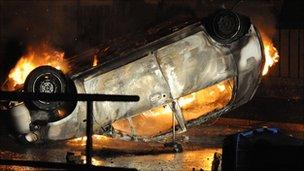Ballyclare riots: politics, protocol and flags
- Published
- comments
"You can't eat a flag" as John Hume used to famously say. But when can you take a flag down, if someone objects to it fluttering from a local lamp post or telegraph pole?
The police apologised to those who "felt that they have not received the police service we strive to deliver" after the removal of flags near a Catholic church triggered a night of loyalist violence in Ballyclare.
But Alliance leader and Justice Minister David Ford defended the police action as "in line with the flag protocol".
The protocol's objectives - summarised in our main news story - include removing "paramilitary flags and displays" and "the control of displays of flags and emblems in particular areas such as mixed and interface areas and near buildings such as schools, hospitals, places of worship and community halls".
The protocol is the responsibility of the first and deputy first minister's office - although its implementation is down to the police and the environment department also has a role.

Hijacked cars were used to charge police lines during the trouble in Ballyclare
Significantly it dates back to the days of direct rule, having been published in April 2005, when Labour's Paul Murphy was secretary of state and the Stormont executive was suspended.
The 2005 protocol aimed to work towards the removal of flags from arterial routes, limiting the flying of flags to particular periods and encouraging the removal of tattered flags.
However Queen's University academic Dominic Bryan, whose department has been monitoring its implementation, concluded that the policy has been a failure.
Overstepping
Dr Bryan's latest report, external says "the numbers of flags and emblems on display have remained remarkably consistent over the five years and there has been little reduction in the length of time the flags are flying."
He argues that efforts to reduce the display of flags on arterial routes have been "largely ineffectual".
The protocol isn't the only official document which governs the flying of flags.
The Terrorism Act 2000 makes it an offence for someone to "invite support for a proscribed organisation" - a clause which could cover paramilitary flags.
Although, as Dominic Bryan points out, you can then get into debate about particular flags.
Is one insignia, for example, commemorating the "old" UVF or the current proscribed organisation?
Over "the Twelfth", another restriction on flags has been provoking debate.
This is the power granted to the Parades Commission under the Public Processions (NI) Act 1998.
The commission often rules that no paramilitary flags should be displayed by marchers.
Highly charged
However in its determination on the Ligoniel True Blues Lodge's application march up the Crumlin Road past the Ardoyne shops (an annual flashpoint in north Belfast), the commission stipulated that "all flags must be furled and no bannerette may be visibly displayed".
This catch-all exclusion angered unionists, including the DUP leader Peter Robinson, who last week criticised the commission for "overstepping the mark" in dictating that all flags, including the Union flag, should be furled and telling Orangemen which hymns they can sing on their parades.
Mr Robinson claimed the "authoritarian attitude" of the Parades Commission had become "unacceptable and intolerable".
Now the commission appears to have had a rethink. According to the North Belfast MP Nigel Dodds, the commission has clarified that the restriction will not apply to the Union flag.
According to David Ford, a Stormont executive sub-group is due to review the 2005 flags protocol soon.
However Dominic Bryan points out that the policy had been due for review after one year, but this never occurred.
Indeed the grant provided for research to monitor how many flags are flying on our lampposts has now run out.
With the first minister getting involved in debates about whether flags should be furled or unfurled, and Sinn Fein accusing the DUP of lacking leadership on the matter, there's no doubt that the issue of flags remains highly charged.
No-one should hold their breath whilst waiting for local politicians to come up with a clear alternative to the five-year-old direct rule protocol.